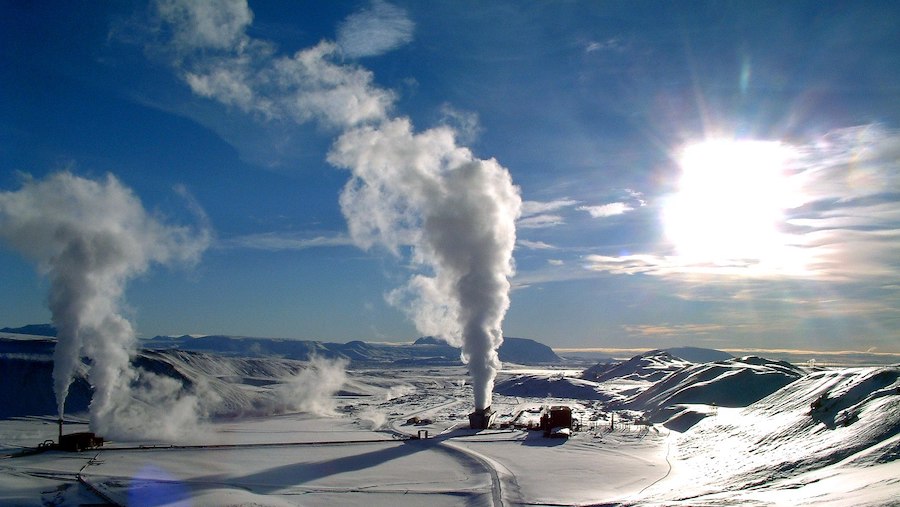
Geothermal could become a terawatt source of energy with the power densities of fossil fuels if the ability to drill to 20 kilometers and 500 degrees celsius is developed.
This, according to experts gathered in late July at the PIVOT2021 conference organized by the Geothermal Entrepreneurship Organization (GEO) at the University of Texas and which was focused on the challenges and opportunities of geothermal energy, and in particular of reaching the superhot rock deep beneath our feet.
Conventional geothermal plants reach temperatures of about 230 degrees celsius through holes about two kilometers deep. Superhot rock can be found close to the surface in a few areas like Iceland and near volcanoes, but for most of the world, it is between seven and 20 kilometers beneath the surface.
According to the panellists at the conference, things get especially interesting over about 374 degrees celsius, where water pumped to rock becomes supercritical, in a steam-like phase. This supercritical water can carry some 5-10 times more energy than regular hot water, making it an extremely efficient energy source if it could be pumped above ground to turbines that could convert it into electricity.
But drilling techniques are not quite there yet.
In a session titled “In Pursuit of the Holy Grail: Deep and Superhot Geothermal” presenters said that conventional drill bits used in the oil and gas industry fail under the extreme temperatures and pressures involved in reaching geothermal sources.
Modern drills also include electronic components that do not withstand extreme conditions, while other elements, such as materials for lining and supporting the boreholes, also need to survive repeated thermal cycling or large changes in temperature.
Superhot rock can be found close to the surface in a few areas like Iceland and near volcanoes, but for most of the world, it is between seven and twenty kilometers down.
Yet, steps towards solving these issues are being taken. The experts mentioned self-healing cement that recrystallizes to fix any fractures and the use of more accurate data to characterize subsurface rock conditions and better calibrate devices going into very deep systems.
“Open access to the data and models that are underpinning these pilot projects are key,” Mark Ireland, a lecturer in energy geoscience at Newcastle University, said during the session. “Then we can open the lid on the box and explore all the different parameters in it, and compare and contrast how we’re characterizing the potential resource. The more we’re able to share, the better our decision making.”
To that end, Ireland and others emphasized the need for collaboration between the groups worldwide that are exploring superhot geothermal.
The future for Geothermal
An example of such a group is Quaise Energy, whose representatives presented their gyrotron at the conference’s “The Future of Drilling for Deep Geothermal” session.
Quaise’s machine works by creating millimeter wave energy, a cousin to the microwaves for cooking, that is directed to deep, hot rock via waveguides. A gas that accompanies the millimeter waves brings the vaporized rock back up to the surface.
According to the firm’s CEO, Carlos Araque, conventional drilling techniques are used in the shallower rock they were optimized for and then, they are switched over to the millimeter-wave technology for harder, hotter, deeper rock.
Geothermal Anywhere Drilling, on the other hand, uses plasma, an energized gas, to break deep, hard rock into tiny pieces. Their technology is embedded into conventional drilling systems and it is being tested at a state-of-the-art facility near Bratislava, Slovakia that can reproduce the high pressures and temperatures far underground.
Another approach showcased was that of HyperSciences, whose hypersonic projectiles fired in front of a rotating bit are said to allow it to drill about 10 times faster in hard, deep, high-temperature rock. This technology — as the other ones — is being tested in field trials, and it is also being applied to tunnelling, mining, and aerospace.
A final project, titled ORCHYD and supported by the European Union, was presented by researchers from ARMINES/ MINES-ParisTech in France. Still under development, their technique involves combining high-pressure water jetting with percussive drilling.
“I see coming down the pike a number of really high potential drilling methods” Susan Petty, chief technology officer at Cyrq Energy and the president and founder of AltaRock Energy, said at the conference.
Source: Mining.com
